
Regional Sustainability
Scope & Guideline
Unveiling solutions for a greener, more sustainable world.
Introduction
Aims and Scopes
- Sustainable Development Goals (SDGs) Implementation:
Research on how various regions implement and achieve the SDGs, focusing on socio-economic and environmental factors that influence progress. - Climate Change Adaptation and Mitigation:
Studies addressing the impacts of climate change on local communities and ecosystems, as well as strategies for adaptation and mitigation tailored to regional contexts. - Land Use and Environmental Impact Assessment:
Investigations into land use changes and their implications for ecological sustainability, including assessments of various land management practices. - Socio-economic Development and Livelihoods:
Exploration of socio-economic dynamics, including rural development, livelihoods, and community resilience in the face of environmental challenges. - Ecosystem Services and Biodiversity Conservation:
Research focused on the valuation of ecosystem services, biodiversity conservation efforts, and the interactions between human activities and natural environments. - Cultural and Traditional Practices in Sustainability:
Examination of how local cultural practices and traditional knowledge contribute to sustainable development and environmental management.
Trending and Emerging
- Interdisciplinary Approaches to Sustainability:
There is an increasing trend towards interdisciplinary research that combines insights from social sciences, environmental sciences, and economics to address complex sustainability challenges. - Local Community Engagement in Sustainability:
Research focusing on the role of local communities in sustainability efforts is gaining prominence, highlighting grassroots movements and community-based resource management. - Climate Resilience and Risk Management:
The importance of building climate resilience through adaptive strategies is increasingly emphasized, with studies exploring innovative practices that enhance community and ecosystem resilience. - Digital Technologies in Sustainability:
Emerging research on the applications of digital technologies, including GIS and big data analytics, for enhancing sustainability practices and decision-making processes. - Sustainable Tourism and Ecotourism:
A growing interest in sustainable tourism practices and their impacts on local economies and ecosystems is evident, reflecting the increasing importance of tourism in regional sustainability discussions.
Declining or Waning
- Urbanization and Economic Growth:
While urbanization remains a critical area, the specific focus on its relationship with economic growth has decreased, possibly due to a shift towards more integrated approaches that consider social and environmental dimensions. - Traditional Agriculture Practices:
The exploration of traditional agricultural practices has become less prominent, as the focus shifts towards modern, sustainable agricultural practices and technology-driven solutions. - Infrastructure Development Impacts:
Research specifically examining the impacts of infrastructure development on sustainability has waned, as broader themes of integrated regional development gain traction. - Single-issue Environmental Studies:
Papers focusing solely on environmental issues without considering socio-economic factors have declined, reflecting a growing recognition of the interconnectedness of these domains. - Sector-specific Policies:
The emphasis on policies targeting specific sectors (like transport or energy) has declined, with a move towards more holistic, cross-sectoral policy approaches.
Similar Journals
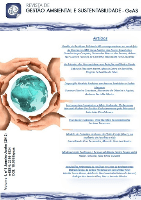
Revista de Gestao Ambiental e Sustentabilidade-GeAS
Navigating the Intersection of Geography and SustainabilityRevista de Gestao Ambiental e Sustentabilidade-GeAS, an esteemed open-access journal published by UNIV NOVE JULHO in Brazil, focuses on critical issues related to environmental management and sustainability, fostering interdisciplinary research that spans Geography, Urban Studies, and Environmental Science. With its commitment to accessibility since 2012, GeAS serves as a vital platform for researchers, professionals, and students to disseminate knowledge and innovative solutions in the realm of sustainability. Although it currently holds a Q4 ranking in Geography, Planning and Development and Management, Monitoring, Policy and Law, and Q3 in Urban Studies as of 2023, the journal aims to elevate its impact within these fields. It is uniquely positioned to contribute to the dialogue on environmental issues, policy implications, and urban development challenges in a rapidly evolving world. The journal's location in São Paulo further enriches its relevance and expertise in addressing both local and global environmental concerns.

Frontiers in Sustainable Cities
Empowering Communities with Cutting-edge Urban ResearchFrontiers in Sustainable Cities, published by FRONTIERS MEDIA SA, is an esteemed academic journal dedicated to advancing the fields of Urban Studies, Renewable Energy, and Public Administration. With a commitment to open access since 2019, the journal facilitates the dissemination of high-quality research aimed at creating sustainable urban environments. Operating from Lausanne, Switzerland, this influential publication supports knowledge exchange among researchers, professionals, and students involved in the complex dynamics of urban sustainability. The journal has achieved notable recognition, reflected in its quartile rankings—Q1 in Urban Studies and Q2 in both Public Administration and Renewable Energy, Sustainability and the Environment—indicating its relevance and impact within the scholarly community. Researchers benefit from a broad reach through its open access policy, enhancing visibility and accessibility of important findings that contribute to the development of sustainable cities globally.

Regional Environmental Change
Navigating the Challenges of Environmental ChangeRegional Environmental Change, published by SPRINGER HEIDELBERG, is a leading journal dedicated to the critical field of Environmental Science, specifically focusing on the global and planetary changes affecting our regional environments. Since its inception in 2005 and continuing through 2024, the journal has been a pivotal platform for disseminating cutting-edge research, insights, and methodologies that address pressing environmental issues. With an impressive Scopus rank, placing it in the top 30% of journals in its category, Regional Environmental Change (ISSN: 1436-3798; E-ISSN: 1436-378X) showcases high-quality academic articles that engage with the multifaceted impacts of environmental shifts, providing researchers, professionals, and students with vital knowledge and data. Although the journal does not currently offer Open Access, it remains a crucial resource for those committed to understanding and mitigating the effects of environmental change on regional ecosystems and communities.
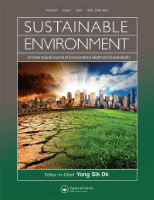
Sustainable Environment
Driving impactful research to tackle environmental challenges.Sustainable Environment, published by Taylor & Francis Ltd, is a pioneering journal dedicated to advancing the field of sustainability studies. Since its inception in 2021, this open-access journal has sought to provide a platform for multidisciplinary research that addresses pressing environmental challenges and sustainable practices. With a commitment to disseminating high-quality research swiftly, Sustainable Environment aims to engage researchers, policymakers, and practitioners across various domains, fostering scholarly dialogue and innovation. The journal covers a broad range of topics, including climate change, resource management, and sustainable development, making it a vital resource for anyone looking to contribute to and understand contemporary environmental issues. With its flexible access options, readers from all backgrounds can benefit from the latest insights and findings in sustainability research, thereby promoting a more sustainable future.

Geography and Sustainability
Connecting Geography and Ecology for a Greener Tomorrow.Geography and Sustainability is a prestigious, peer-reviewed journal published by Elsevier, focusing on the interdisciplinary fields of geography, ecology, and environmental science. As an Open Access publication since 2020, it aims to provide a platform for the dissemination of high-quality research that addresses critical sustainability challenges facing our planet. Based in China, the journal navigates through an impressive array of categories, all classified in the Q1 Quartile rankings for 2023, showcasing its top-tier status in areas such as Earth-Surface Processes, Geography, Planning and Development, and Nature and Landscape Conservation. With its notable impact factors—ranked 2nd in Earth and Planetary Sciences and 3rd in Environmental Science—it attracts contributions from leading experts and emerging scholars alike. Researchers, professionals, and students seeking to advance the scientific understanding of sustainability and its geographical implications will find indispensable resources and innovative findings within the pages of this journal.

Chinese Geographical Science
Elevating Geographical Inquiry for a Sustainable Future.Chinese Geographical Science is a prestigious, peer-reviewed journal published by Springer, dedicated to the dynamic and interdisciplinary fields of Earth and Planetary Sciences and Geography, Planning and Development. With an impressive 2023 Q1 ranking in both categories, the journal supports the dissemination of groundbreaking research from a global perspective, reflecting its significance in the scientific community. The journal is indexed under the highly regarded Scopus database, where it ranks in the top percentile in both Geography and Earth Sciences, illustrating its commitment to excellence and impact within these disciplines. Since its inception in 1991, it has provided a vital platform for researchers and scholars to share their findings, address pressing geographical issues, and contribute to the development of innovative solutions for sustainable development. Although it operates under a subscription model, its rigorous peer-review process ensures that the highest quality of research is published. By fostering collaboration and dialogue among scholars, Chinese Geographical Science plays an essential role in advancing knowledge and shaping policy in geographical sciences and beyond.
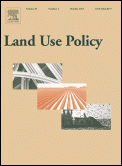
LAND USE POLICY
Navigating Complexities in Land Use ManagementLAND USE POLICY, published by ELSEVIER SCI LTD, is a premier academic journal dedicated to advancing the study of land use issues and policies, with a particular focus on sustainable management and conservation practices. Since its inception in 1984, this journal has established itself as an influential platform in the fields of Forestry, Geography, Planning and Development, and Environmental Science, consistently achieving a Q1 category ranking across various disciplines. With an impressive impact factor and recognition as a top-tier source (e.g., ranking #18/821 in Geography and Planning), it serves as a critical resource for researchers, practitioners, and policy-makers looking to address complex land use challenges. Although it does not offer open access, the journal's articles are widely accessible through institutional subscriptions, enhancing its reach. Researchers and students can find valuable insights into innovative policies and methodologies that promote sustainable land management, making LAND USE POLICY essential reading for anyone engaged in environmental studies and policy development.
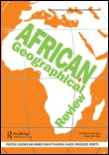
African Geographical Review
Unveiling Innovative Perspectives on African GeographyAfrican Geographical Review is a pivotal academic journal published by Routledge Journals, Taylor & Francis Ltd, whose mission is to advance knowledge and understanding of geographical dynamics across the African continent. With an ISSN of 1937-6812 and an E-ISSN of 2163-2642, this journal consistently delivers high-quality research, showcasing innovative perspectives and interdisciplinary approaches within the fields of Earth-Surface Processes and Geography, Planning and Development. Recognized in 2023 with a Q2 ranking in these categories, it ranks #231 out of 821 in Social Sciences and #63 out of 179 in Earth and Planetary Sciences according to Scopus metrics, reflecting its substantial impact and relevance. Featuring research that spans various geographic themes, the journal not only champions academic inquiry but also fosters a deeper understanding of spatial and environmental challenges unique to Africa. Engaging with a diverse audience of researchers, professionals, and students, the African Geographical Review serves as an indispensable resource for those committed to enhancing geographic scholarship and informing sustainable development practices across the continent.

Geographica Pannonica
Navigating the Frontiers of Geographical ResearchGeographica Pannonica is a premier, open-access journal dedicated to the various dimensions of geography, atmospheric sciences, geology, and related fields. Published by the University of Novi Sad's Faculty of Natural Sciences and Mathematics, this Serbian journal has been a vital platform for scholarly discourse since its inception, with an open-access policy established in 2010 to enhance the dissemination of research findings. Covering a spectrum of topics from Earth-surface processes to tourism management, the journal has achieved notable rankings, reflecting its commitment to impactful research—ranking in the Q3 quartile across multiple categories in 2023. Researchers, professionals, and students are encouraged to engage with the latest articles that contribute to advancing our understanding of geographical phenomena and sustainability challenges, making Geographica Pannonica an essential resource for the global academic community.
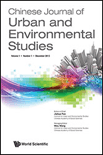
Chinese Journal of Urban and Environmental Studies
Advancing Knowledge for Sustainable Urban FuturesChinese Journal of Urban and Environmental Studies, published by World Scientific Publishing Co Pte Ltd, stands at the intersection of urban studies and environmental research, providing a critical platform for the dissemination of knowledge and innovative ideas in these increasingly vital fields. With an ISSN of 2345-7481 and E-ISSN 2345-752X, this open-access journal has been recognized for its significant contributions, achieving impressive quartile rankings, including Q2 in Urban Studies and Q2 in Geography, Planning and Development for 2023. As it converges from 2019 to 2024, the journal aims to foster interdisciplinary collaboration and to stimulate dialogue among researchers, professionals, and policymakers. With its focus on relevant socio-economic and environmental issues, Chinese Journal of Urban and Environmental Studies serves as an essential resource for anyone looking to gain insight into the complexities of urban environments and their ecological impacts, making it an indispensable addition to the libraries of those committed to sustainable development and urban planning.